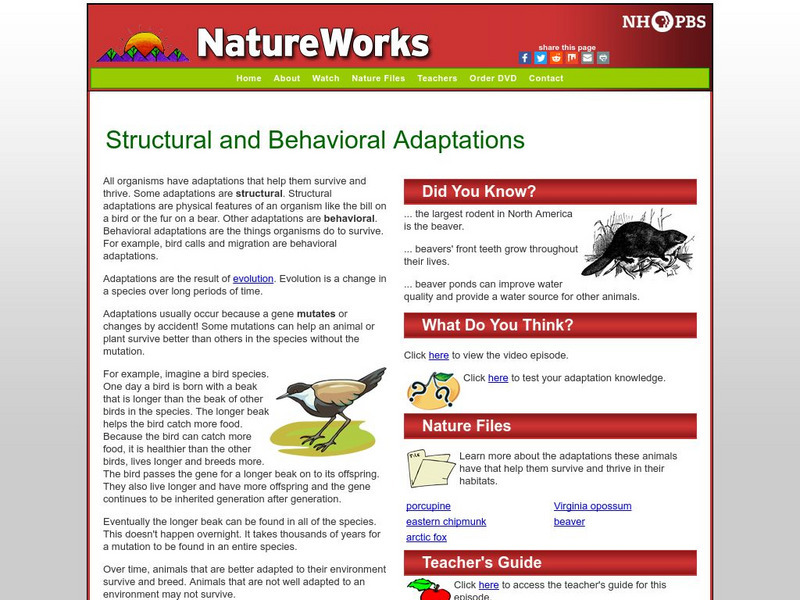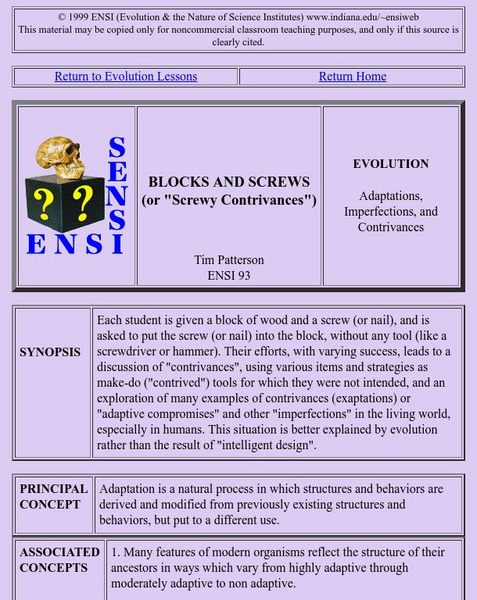Hi, what do you want to do?
NOAA
Noaa: Estuaries 101 Curriculum: Biodiversity in an Estuary
This activity introduces students to the amazing biodiversity of an estuarine environment, focusing on the habitats in the Rookery Bay National EstuarineResearch Reserve, Florida. They begin by exploring the estuary using Google Maps....
Other
Nasa: The Case of the Prize Winning Plants [Pdf]
This program uses a scenario with fictional detective characters to present plant growth to learners. While the unit focuses on the basic needs and parts of plants, the topics of plant classification and adaptations, soil formation and...
PBS
Nh Pbs: Nature Works: Communication
This comprehensive site describes how communication is an adaptation that is important for survival.
The Wonder of Science
The Wonder of Science: 3 Ls4 3: Habitats and Organism Survival
Work samples, phenomena, assessment templates, and videos that directly address standard 3-LS4-3: habitats and organism survival.
University of California
South Coast Science Project: Mimicking Plants and Animals Lesson Plan
In this lesson, students are challenged to think about external features that animals and plants have that humans have copied. Students then apply their engineering skills to design a jacket. In addition, this activity introduces the...
PBS
Nh Pbs: Nature Works: Coloration
This competent site describes how structural adaptations help organisms survive. Deceptive and advertising coloration are explained.
The Wonder of Science
The Wonder of Science: 3 Ls4 2: Variation, Survival, and Reproduction
Work samples, phenomena, assessment templates, and videos that directly address standard 3-LS4-2: variation, survival, and reproduction
University of Michigan
Michigan Sea Grant: Teaching Great Lakes Science: Fish Identification
In this lesson, students examine the physical characteristics of fish that live in the Great Lakes and identify common features that help species to survive in that environment. Downloadable resources include a fish poster, fish family...
Utah Education Network
Uen: Nhmu: Adaptation Scavenger Hunt
Recognize the specific adaptations of living things and relate them to survival within the animals environment.
Utah Education Network
Uen: Nhmu: Birds Will Be Birds
Analyze the physical characteristics of 12 different birds and consider how this enables them to survive in their individual habitats.
Utah Education Network
Uen: Life's Different Seasons
Recognize changes in bears and insects and compare them.
Better Lesson
Better Lesson: Survival of the Fittest
Fins, gills, claws, wings, each has a special purpose in helping an animal to survive. Students will look at how animals have different parts that help them to adapt to their habitat, and to avoid predators or capture prey. Included in...
Utah Education Network
Uen: Animal Adaptations
A multitude of activities provide help with understanding animal adaptations.
Utah Education Network
Uen: Trb 4:5 Investigation 3 Web of Life
Understand environments and how organisms adapt to their environment.
Utah Education Network
Uen: Plant and Animal Communities
Learn about the six main classes of the animal kingdom.
BBC
Bbc Schools: Ks2 Bitesize: Science: Living Things: Plant and Animal Habitats
Place the aliens in the habitats where they can survive the best. Following the activity, read more about plant and animal habitats, and then take a quick quiz to check for understanding.
Utah Education Network
Uen: Build a Bug : Bugs Don't Bug Me
Students learn what adaptations macroinvertebrates have in order to live in an aquatic environment.
Utah Education Network
Uen: Trb 4:5 Investigation 5 Desert Dynamics
Fourth graders will understand how plants and animals adapt to their environment.
American Museum of Natural History
American Museum of Natural History: Crazy Camouflage
Create a flounder fish that's hard to spot. In this hands-on activity, students gather evidence to explore how camouflage helps animals survive.
PBS
Pbs Learning Media: Mimicry: The Orchid and the Bee
In this photograph from Oxford Scientific Films, a horned bee attempts to mate with an Ophrys orchid, which has evolved to resemble a female bee.
PBS
Nh Pbs: Nature Works: Structural and Behavioral Adaptations
This effective site focuses on how structural and behavioral adaptations help organisms survive and reproduce.
Indiana University
Ensi: Blocks and Screws Lesson Plan
The Evolution and the Nature of Science Institute offers lesson plans that investigate the vestigial organs in such a way as to better explain their imperfections as proof of evolution rather than the result of "intelligent design."
E-learning for Kids
E Learning for Kids: Science: Iceland: What Are Adaptations?
Join Ike when he travels in the Arctic to learn about how animals adapt to cold environments.
E-learning for Kids
E Learning for Kids: Science: Nova Zembla Expedition: How Are Different Organisms Suited to Their Habitats?
Alex and Foxy White are walking around looking at animals and learning about their habitats. Join them on their expedition.






![Nasa: The Case of the Prize Winning Plants [Pdf] Lesson Plan Nasa: The Case of the Prize Winning Plants [Pdf] Lesson Plan](https://static.lp.lexp.cloud/images/attachment_defaults/resource/large/FPO-knovation.png)










